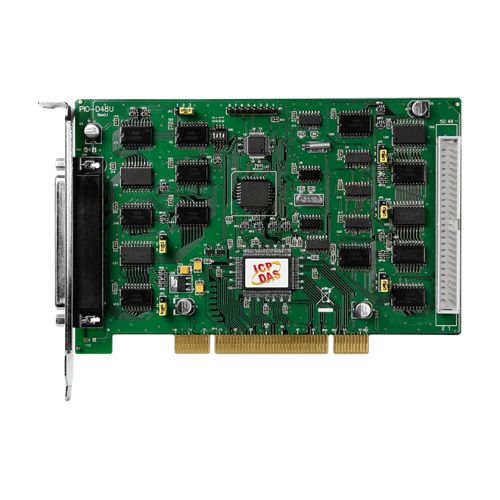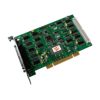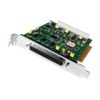features and benefits
The PIO-D48U supports 3.3 V/5 V PCI bus.
These cards provide 48 TTL digital I/O lines, and these lines are grouped into six 8-bit bi-direction ports.
Every three 8-bit ports are grouped as port A (PA), port B (PB) and port C (PC) on a connector, and the port C can be split into 2 nibble-wide(4-bit) parts.
All ports are configured as inputs upon power-up or reset. The PIO-D48U also adds a Card ID switch and pull-high/ pull-low resisters for DI on board.
Users can set Card ID on a board and recognize the board by the ID via software when using two or more PIO-D48U cards in one computer.
The pull-high/ pull-low resisters allow the DI status to be specified when the DI channels are unconnected; the DI status will remain in high or low status other than floating. The cards support various OS versions, such as Linux, DOS, Windows.
DLL and Active X control together with various language sample program based on Turbo C++, Borland c++, Microsoft C++, Visual C++, Borland Delphi, Borland C++ Builder, Visual Basic, C#.NET, Visual Basic.NET and LabVIEW are provided in order to help users to quickly and easily develop their own applications.
- Universal PCI (3.3 V/5 V) Interface
- 48 Buffered TTL Digital I/O Lines
- Six 8-bit Bi-directional Programmable I/O Ports
- Emulates two Industrial-standard 8255 PPI Ports (Mode 0)
- All I/O Lines Buffered on the Board
- 4-channel Interrupt Source
- Supports Card ID (SMD Switch)
- Supports DO Status Readback (Register Level)
- Buffer Output for Higher Driving Capability
- DI/O Response Time approximately 1 μs (1 MHz)
specifications
Hardware| Card ID | Yes (4-bit) |
|---|
| Connector | Female DB37 x 1 | 50-pin box header x 1 |
|---|
Digital Input| Channels | 48 (Bi-Direction) |
|---|
| Type | 5 V/TTL |
|---|
| Sink/Source (NPN/PNP) | Sink: 64 mA @ 0.8 V | Source: 32 mA @ 2.0 V |
|---|
| ON Voltage Level | Logic 1: 2.0 V Min. |
|---|
| OFF Voltage Level | Logic 0: 0.8 V Max. |
|---|
| Response Speed | 1 MHz (Typical) |
|---|
| Trigger Mode | Static Update |
|---|
Digital Output| Channels | 48 (Bi-Direction) |
|---|
| Type | 5 V/TTL |
|---|
| Operation Mode | Static Update |
|---|
| Load Voltage | Logic 0: 0.4 V Max. | Logic 1: 2.4 V Min. |
|---|
| Response Speed | 1 MHz (Typical) |
|---|
Timer/Counter/Frequency| Channels | 2 (Event Timer x 1/32-bit Timer x 1) |
|---|
| Type | 5 V/TTL |
|---|
| Resolution | 16-bit |
|---|
| Reference Clock | Internal: 4 MHz |
|---|
PC Bus| Type | 3.3 V/5 V Universal PCI, 32-bit, 33 MHz |
|---|
| Data Bus | 8-bit |
|---|
Power| Consumption | 900 mA @ +5 V |
|---|
Mechanical| Dimensions (mm) | 105 x 156 x 22 (W x L x D) |
|---|
Environment| Operating Temperature | 0 ~ +60°C |
|---|
| Storage Temperature | -20 ~ +70°C |
|---|
| Humidity | 5 ~ 85% RH, Non-condensing |
|---|






